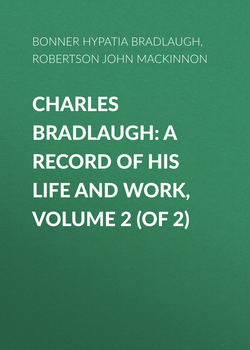Charles Bradlaugh: a Record of His Life and Work, Volume 2 (of 2)

Реклама. ООО «ЛитРес», ИНН: 7719571260.
Оглавление
Bonner Hypatia Bradlaugh. Charles Bradlaugh: a Record of His Life and Work, Volume 2 (of 2)
PART I
CHAPTER I. IN THE UNITED STATES AGAIN
CHAPTER II. MRS BESANT
CHAPTER III. PROSECUTION OF MR BRADLAUGH AND MRS BESANT
CHAPTER IV. AN UNIMPORTANT CHAPTER
CHAPTER V. MORE DEBATES
CHAPTER VI. SOME LATER LECTURES
CHAPTER VII. LUNATICS
CHAPTER VIII. THE "WATCH" STORY
CHAPTER IX. OTHER FABLES
CHAPTER X. PEACE DEMONSTRATIONS, 1878
CHAPTER XI. THE NATIONAL SECULAR SOCIETY
CHAPTER XII. THE LAST CHAPTER
PART II
CHAPTER I. PHILOSOPHY AND SECULARIST PROPAGANDA
CHAPTER II. POLITICAL DOCTRINE AND WORK
CHAPTER III. THE PARLIAMENTARY STRUGGLE
CHAPTER IV. CLOSING YEARS
APPENDICES
APPENDIX I
APPENDIX II
APPENDIX III
Отрывок из книги
Mr. Bradlaugh had agreed to make a second lecturing tour through the States in the autumn of 1874, and he started on it under the most inauspicious circumstances. We have just seen how he was obliged to delay his journey – just as earlier in the year he had been obliged to hasten his return – to contest the election at Northampton, where he was once more defeated for the third and last time. He had originally taken his passage by the White Star Line, in the Republic, leaving on September 24th. At his request the owners obligingly transferred him to the Baltic, leaving October 1st. Unable to get away by this boat, he forfeited his passage, and leaving Northampton on the night of the poll, he just caught the Cunard ship the Parthia at Queenstown on the 7th. He started on his voyage despondent, utterly wearied, and with "a tightish sensation about the heart," for he had hoped and believed until the last half-hour that he was going to win the election. He thought, too, that before he had left the town he had succeeded in pacifying his disappointed and angry supporters in Northampton, but the receipt of a telegram at Holyhead, telling him of the rioting there and the calling out of the military, depressed him more than ever.
When he got on board the Parthia a curious little incident happened. As he was "standing gloomily, watching the last package carried on board," he wrote, "I was approached by a man, a steerage passenger, who, reverently touching his billycock hat, said, 'Father, do you go with us to the other side?' For a moment I was puzzled; but seeing that the man was serious, I answered, 'You are mistaken; I am not a Father.' The man looked dubious, nervously scratched the deck with a blackthorn held loosely in his left hand, and rejoined, 'No offence meant; I ask your reverence's pardon, but anyhow, it will be a blessing to have you with us on board, Father.' That I looked clerical I had been told by the Gaulois, which described me in 1871, when attending the Paris Courts Martial, as dressed like a bishop; but this man's evidently earnest disbelief in my repudiation of priestly honours, coupled with his quiet acquiescence, made me doubt whether I was really the man who had been placarded a few hours before in Northampton as 'Bradlaugh the Blasphemer.'"
.....
Speaking of his sudden return a week or two later, Mr Bradlaugh said: "I came back to England because I was advised that it would have been suicide in my weak state to face the Western winter. I come back to Europe reluctantly, for I went to the United States to earn enough money to pay my debts, and I am compelled to return poorer than I left. Indeed, I owe it to Mr Moncure D. Conway's assistance that I was enabled, at the moment, to discharge the obligations my illness had created in New York."
Mr Conway has since told me that when he went to see my father while he lay ill in the St Luke's Hospital, my father begged him to make inquiries of nurse and doctors whether he had said or done anything during the time of his illness which could be construed into an alteration of his opinions upon religious subjects. He wished Mr Conway, in the event of his death, to bear testimony that his convictions had remained unchanged. Mr Conway, whose own opinions were by no means so heretical as Mr Bradlaugh's, was nevertheless anxious to carry out the wishes of the sick man with the utmost exactitude, and therefore made the most scrupulous inquiries. But he only learned that Mr Bradlaugh had been a most docile, uncomplaining, and grateful patient, and that he had not uttered a single word which could afford the slightest justification for a suggestion of recantation. That my father's dread of the usual "infidel deathbed" myth was well founded we know by what has happened since 1891. Even as it was, although he recovered from his illness in New York, and was alive to contradict such fables, it was actually said that he had sent for a minister to pray with him, and one clergyman was even reported to have specified the "minister" as a Baptist! It was long before my father entirely recovered from this illness, and although formerly a smoker, after this he lost all desire for a cigar. It was not until a few years before his death that he renewed the habit, and even then only in a very modest way – a cigar in going to the House of Commons, a cigar in coming back he enjoyed; at other times he smoked little.
.....